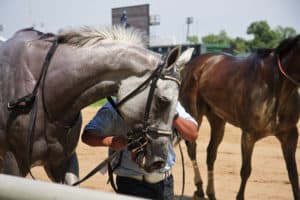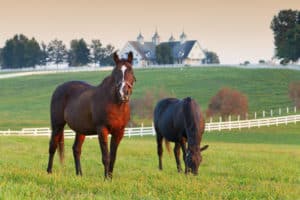
Mineral of the Month: Iron
Iron deficiencies are rare in horses, especially in those with access to good-quality pasture and hay.

Iron deficiencies are rare in horses, especially in those with access to good-quality pasture and hay.

Dr. Fatai Oladunni is studying how EHV-1 suppresses type I interferon (a large subgroup of interferon proteins that help regulate immune system activity) responses.

Horses with Warmblood fragile foal syndrome have extremely fragile skin and abnormal joint laxity.

Carleigh Fedorka, PhD, a postdoctoral scholar at the University of Kentucky Gluck Equine Research Center, started the campaign to fund her study “Hormone therapy: Suppressing your mare’s estrous, or suppressing her immune system?”

Researchers are asking horse owners, managers, and riders to complete a survey about air quality, conditions, arena footing, and associated health outcomes in horses and humans.

The University of Kentucky’s Gluck Equine Research Center is the only scientific institute in the United States with nearly all of its faculty conducting full-time equine health and disease research.

An average mature horse at rest or performing light exercise requires 3.5 milligrams of iodine per day. This increases in late gestation, lactating broodmares, and horses in heavy work.

Boudaher is studying Rhodococcus equi under the direction of Carrie L. Shaffer, PhD, assistant professor at the Gluck Center.

Pasture managers can take simple steps to develop a healthy root system and, in turn, a more resilient and productive pasture. Here’s how.
Speakers will present on cost sharing, weed control, rotational grazing, ryegrass, and maintaining healthy horses.
The Equine Research Hall of Fame recognizes individuals who have had distinguished careers in equine research.
Mok used Robert Frost’s famous poem “The Road Not Taken” as an analogy to explain the developmental fate of cells that synthesize joint cartilage.

Participating farms receive detailed pasture assessments, including grass species composition and tall fescue analysis.

In her new position Dr. Emma Adam will work to forge links between the equine industry and the University of Kentucky so more people can leverage the combined resources and share knowledge.

The USDA NASS needs a Census of Agriculture response from all U.S. farms, including Kentucky horse farms.

While an average 1,100-pound adult horse at rest or lightly exercised requires only 400 milligrams per day, this mineral is important to bone and cartilage development.
Stay on top of the most recent Horse Health news with